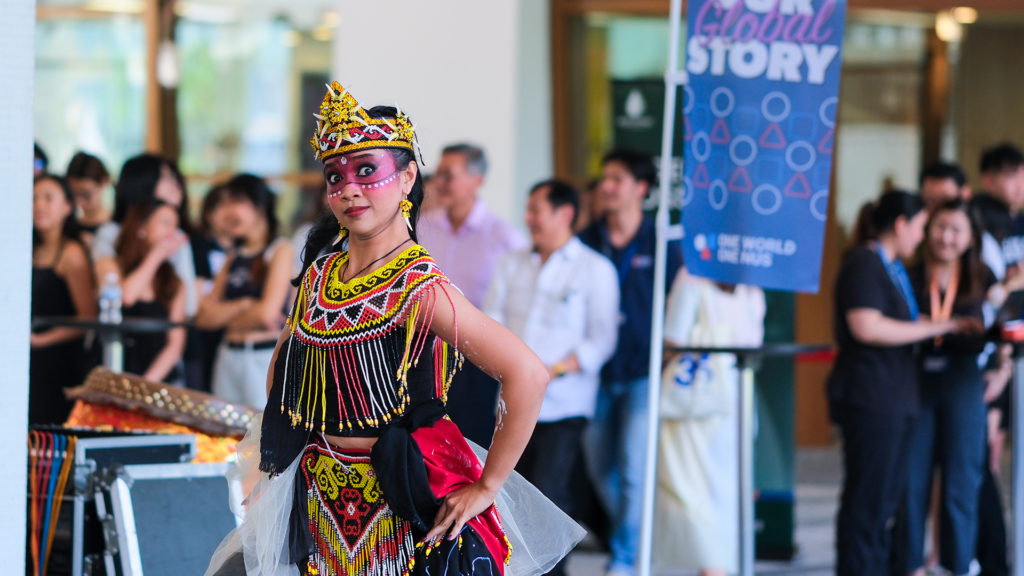A vibrant tapestry: 120 years of diversity and excellence at NUS
May 8, 2025
Amid the strains of Balinese music, an Indonesian dancer — decked in gold from head to toe — launched into a traditional legong dance. Intricate hand movements followed increasingly frenzied footwork as the music built to a crescendo.
Following this first act, the dancer changed into an equally elaborate costume — this time more kaleidoscopic and silken — but moved to a more sedate rhythm in a dance inspired by Bornean traditions.
These two performances were put up by first-year Master of Arts (Arts and Cultural Entrepreneurship) student Ni Komang Ananda Gayatri at the NUS120: Our Global Story event, a cultural fiesta held at the NUS Central Library Atrium on 16 April 2025.

“Through dance, I’ve crossed oceans. I’ve met people, shared stories… And somehow, dancing brought me to NUS, one of the top universities in the world,” said Ananda, who hails from East Kalimantan, the Indonesian part of Borneo island, in a video that clinched second prize in the NUS People Stories Showcase that attracted over 30 submissions from NUS students, staff and alumni from around the world.
The showcase was one of the highlights of the cultural fiesta, which is part of a series of year-long celebrations held to mark NUS’ 120th anniversary. At the event, NUS President Professor Tan Eng Chye reflected on the University’s remarkable growth, paying tribute to a community whose collective efforts have shaped it into a world-class institution.
“We have become an institution that Singaporeans are very proud of,” said Prof Tan. “Today’s event celebrates the people — you! — who have helped to build NUS: our students, our faculty, our staff, as well as our alumni. You form a very vibrant, very diverse and, importantly, integrated and collaborative community, united with one single mission towards excellence.”
The event, attended by over 700 staff and students, was a celebration of such diversity. Not only did participants enjoy a smorgasbord of foods at an international food bazaar, they also watched a variety of performances – from traditional Japanese dance Kasa Odori to street dances by the NUS Korean Cultural Interest Group, set to the tune of contemporary hits like aespa’s “Pink Hoodie”.

Beyond performances, participants also had opportunities to attend workshops by youth organisation Fashion Parade, which included batik, block-printing, and Chinese knot-making. Proceeds from the event, which totalled over S$10,500 dollars, will support NUS Giving’s Enhanced Financial Aid Scheme to enable more students to “enjoy the full suite of the NUS experience, from a one-year stay at the hostel to possibly an exchange programme overseas”, said Prof Tan.
A global nexus

Diversity goes hand in hand with identity and belonging. There was a consensus among those who submitted their stories to the story showcase that NUS had imbued in them a sense of belonging – and for some, even safety.
Instructor of Physiology at Yong Loo Lin School of Medicine, Noof Abdullah Saad Shaif, recalled the deeply challenging time studying medicine in her hometown Yemen amid war, “sleeping in the basement with my emergency bag strapped to me, never knowing if I would wake the next day.” At NUS, however, those fears dissipated and she found “a place I could call home.”
For Ananda, NUS –– home to 120 nationalities –– also offers an important international network. “In my class, we have students from all around the world – Switzerland, America, Malaysia, China, and more – and each of us bring with us different case studies to learn from,” she said, observing that different countries have different approaches to art.
“In Korea, for instance, K-pop has almost become a business product. Now compare that with India or Switzerland –– how are their approaches to their own music different?”
Such insights have encouraged her to set up the Bali-based production house Gayatri Art Lab in 2023, with an aim to preserve and promote Balinese art. “I want to show the world that Bali is not just a beach club,” she added with a smile.
NUS Business School Honorary Fellow Chu Singfat had a slightly wider grin on his face, after his submission was deemed the winning entry of the stories showcase. “Serendipity defines my affinity with NUS,” declared the former analytics professor, whose wife is an NUS Business School alumna, in his video submission. Coincidentally, he joined the school in 1991 and both his children are also studying here now.
Singfat reflected on NUS’ evolution, drawing parallels between the university and Mauritius, where he spent his formative years. Just as Hakka immigrants helped the Mauritian capital of Port Louis flourish as a cosmopolitan city, students and staff from around the world provided expertise that was vital to NUS’ transformation.
After 31 years at NUS, he has realised that the best students leveraged each other’s strengths. “In a team, what you need is somebody who can crunch numbers and somebody who can tell a story — that’s diversity,” he shared.
“I always tell students to form diverse teams — diverse in nationalities, diverse in skills. If you are all the same in a team, you won’t produce great results. Where NUS is today, you can say it’s because of diversity.”

